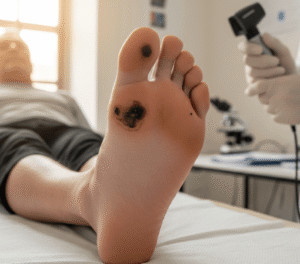People logically think their skin becomes inflamed and the inflammation itches but a team at Harvard have a different explanation.
Their 2023 research showed that bacteria can cause an itch by activating nerve cells in the skin. A fairly common bacteria called staphylococcus aureus, which is found on almost every patient with atopic dermatitis.
That condition and eczema were the focus of the study, although the mechanism may apply in others. The bacteria awakens a protein and starts a process which ends up with signals reaching our brain, telling us we itch.
A chain reaction which acts independently of the inflammation, even though there may be a link between the skin condition and increased bacterial presence.
Potential Benefits
A fresh way of looking at itching opens the door to developing new treatments. Harvard Medical School have already identified an existing anti-clotting drug which is able to block the protein action and eliminate the itch.
There may be alternatives, or a new approach. Further bacteria can be studied to see if any bring similar reactions and itching.
Over 10% of most populations suffer from eczema/dermatitis at some stage in life. More work needs to be done but this seems to be a significant breakthrough, for skin conditions which are common and global.
Likely Development
A financial study released around the same time as the research suggested that the market for antipruritic (anti-itching) medication will continue to grow. This is currently around £9 billion globally and may increase by 45% over the next decade.
The potential market makes R & D viable for drug companies, the world’s population is ageing, skin conditions are increasing regardless of age and the support people receive is not matching this.
A shortage of dermatologists is an acute problem in the UK. One trust recently took steps to develop alternative treatment to specialist support, stating that “Patients impacted by this change will be contacted in due course.”
At least they were open, about a problem which applies nationally in the UK and to other nations in Europe, or elsewhere. Leaving the drug companies to develop solutions which non specialists, or pharmacies might offer.
Taking Due Care
The research is welcome and could help to break the eczema-itch cycle. Equally having better over the counter, or general prescription medication available for itching is helpful, should this become available.
There is still the issue of what is causing the itch, whether this is a medical condition, such as kidney disease, or a wide range of skin conditions.
A cream which stops the itch removes a problem but not the underlying cause. This could be relatively trivial, or a significant health risk, or a skin condition which requires an entirely different approach.
From an experienced dermatologist, treatment for itching is as much about diagnosing and controlling the cause, as eliminating a symptom.



